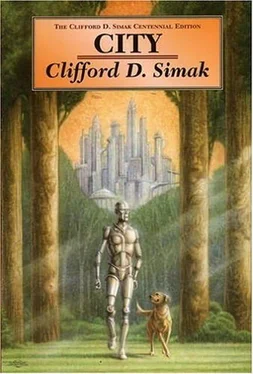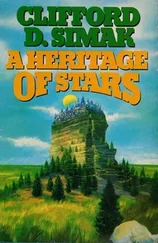Clifford Simak - City
Здесь есть возможность читать онлайн «Clifford Simak - City» весь текст электронной книги совершенно бесплатно (целиком полную версию без сокращений). В некоторых случаях можно слушать аудио, скачать через торрент в формате fb2 и присутствует краткое содержание. Жанр: Фантастика и фэнтези, на английском языке. Описание произведения, (предисловие) а так же отзывы посетителей доступны на портале библиотеки ЛибКат.
- Название:City
- Автор:
- Жанр:
- Год:неизвестен
- ISBN:нет данных
- Рейтинг книги:3 / 5. Голосов: 1
-
Избранное:Добавить в избранное
- Отзывы:
-
Ваша оценка:
- 60
- 1
- 2
- 3
- 4
- 5
City: краткое содержание, описание и аннотация
Предлагаем к чтению аннотацию, описание, краткое содержание или предисловие (зависит от того, что написал сам автор книги «City»). Если вы не нашли необходимую информацию о книге — напишите в комментариях, мы постараемся отыскать её.
City — читать онлайн бесплатно полную книгу (весь текст) целиком
Ниже представлен текст книги, разбитый по страницам. Система сохранения места последней прочитанной страницы, позволяет с удобством читать онлайн бесплатно книгу «City», без необходимости каждый раз заново искать на чём Вы остановились. Поставьте закладку, и сможете в любой момент перейти на страницу, на которой закончили чтение.
Интервал:
Закладка:
"And why should I," asked Joe, "do something for someone who isn't even born yet? Why should I look beyond the years of my own life? When I die, I die, and all the shouting and the glory, all the banners and the bugles will be nothing to me. I will not knew whether I lived a great life or a very poor one."
"The race," said Grant.
Joe laughed, a shout of laughter. "Race preservation, race advancement. That's what you're getting at. Why should you be concerned with that? Or I?"
The laughter lines smoothed out around his mouth and he shook a finger in mock admonishment. "Race preservation is a myth... a myth that you all have lived by – a sordid thing that has arisen out of your social structure. The race ends every day. When a man dies the race ends for him – so far as he's concerned there is no longer any race."
"You just don't care," said Grant.
"That," declared Joe, "is what I've been telling you."
He squinted at the pack upon the ground and a flicker of a smile wove about his lips. 'Perhaps," be suggested, "if it interested me-"
Grant opened up the pack, brought out the portfolio.
Almost reluctantly he pulled out the thin sheaf of papers, glanced at the title:
"Unfinished Philosophical-"
He handed it across, sat watching as Joe read swiftly and even as be watched he felt the sickening wrench of terrible failure closing on his brain.
Back in the Webster house he had thought of a mind that knew no groove of logic, a mind unhampered by four thousand years of mouldy human thought. That, he had told himself, might do the trick.
And here it was. But it still was not enough. There was something lacking – something he had never thought of, something the men in Geneva had never thought of, either. Something, a part of the human make-up that everyone, up to this moment, had taken for granted.
Social pressure was the thing that had held the human race together through all millennia – held the human race together as a unit just as hunger pressure had held the ants enslaved to a social pattern.
The need of one human being for the approval of his fellow humans, the need for a certain cult of fellowship – a psychological, almost physiological need for approval of one's thought and action. A force that kept men from going off at unsocial tangents, a force that made for social security and human solidarity, for the working together of the human family.
Men died for that approval, sacrificed for that approval, lived lives they loathed for that approval. For without it a man was on his own, an outcast, an animal that had been driven from the pack.
It had led to terrible things, of course – to mob psychology, to racial persecution, to mass atrocities in the name of patriotism or religion. But likewise it had been the sizing that held the race together, the thing that from the very start had made human society possible.
And Joe didn't have it. Joe didn't give a damn. He didn't care what anyone thought of him. He didn't care whether anyone approved or not.
Grant felt the sun hot upon his back, heard the whisper of the wind that walked in the trees above him. And in some thicket a bird struck up a song.
Was this the trend of mutancy? This sloughing off of the basic instinct that made man a member of the race?
Had this man in front of him, reading the legacy of Juwain, found within himself, through his mutancy, a life so full that he could dispense with the necessity for the approval of his fellows? Had he, finally, after all these years, reached that stage of civilization where a man stood independent, disdaining all the artificiality of society?
Joe looked up.
"Very interesting," he said. "Why didn't he go ahead and finish it?"
"He died," said Grant.
Joe clucked his tongue inside his cheek. "He was wrong in one place." He flipped the pages, jabbed with a finger. "Right here. That's where the error cropped up. That's what bogged him down."
Grant stammered. "But... but there shouldn't be an error. He died, that's all. He died before he finished it."
Joe folded the manuscript neatly, tucked it in his pocket.
"Just as well," he said. "He probably would have botched it."
"Then you can finish it? You can-"
There was, Grant knew, no use of going on. He read the answer in Joe's eyes.
"You really think," said Joe and his words were terse and measured, "that I'd turn this over to you squalling humans?"
Grant shrugged in defeat. "I suppose not. I suppose I should have known. A man like you-"
"I," said Joe, "can use this thing myself."
He rose slowly, idly swung his foot, ploughing a furrow through the ant hill, toppling the smoking chimneys, burying the toiling carts.
With a cry, Grant leaped to his feet, blind anger gripping him, blind anger driving the hand that snatched out his gun.
"Hold it!" said Joe.
Grant's arm halted with the gun still pointing towards the ground.
"Take it easy, little man," said Joe. "I know you'd like to kill me, but I can't let you do it. For I have plans you see. And, after all, you wouldn't be killing me for the reason that you think."
"What difference would it make why I killed you?" rasped Grant. "You'd be dead, wouldn't you? You wouldn't be loose with Juwain's philosophy."
"But," Joe told him, almost gently, "that's not why you would kill me. You'd do it because you're sore at me for mussing up the ant hill."
"That might have been the reason first," said 'Grant. "But not now-"
"Don't try it," said Joe. "Before you ever pressed the trigger you'd be meat yourself."
Grant hesitated.
"If you think I'm bluffing," Joe taunted him, "go ahead and call me."
For a long moment the two stood face to face, the gun still pointing at the ground.
"Why can't you throw in with us?" asked Grant. "We need a man like you. You were the one that showed old Tom Webster how to build a space drive. The work you've done with ants-"
Joe was stepping forward, swiftly, and Grant heaved up the gun. He saw the fist coming at him, a hamlike, powerful fist that fairly whistled with its vicious speed.
A fist that was faster than his finger on the trigger.
Something wet and hot was rasping across Grant's face and he lifted a hand and tried to brush it off.
But it went on, licking across his face.
He opened his eyes and Nathaniel did a jig in front of them.
"You're all right," said Nathaniel. "I was so afraid-"
"Nathaniel!" croaked Grant. "What are you doing herw?"
"I ran away," Nathaniel told him. "I want to go with you."
Grant shook his head. "You can't go with me. I have far to go. I have a job to do."
He got to his hands and knees and felt along the ground. When his hand touched cold metal, he picked it up and slid it in the holster.
"I let him get away," he said, "and I can't let him go. I gave him something that belonged to all mankind and I can't let him use it."
"I can track," Nathaniel told him. "I track squirrels like everything."
"You have more important things to do than tracking,"
Grant told the dog. "You see, I found out something today. Got a glimpse of a certain trend – a trend that all mankind may follow. Not today nor to-morrow, nor even a thousand years from now. Maybe never, but it's a thing we can't overlook. Joe may be just a little farther along the path than the rest of us and we may be following faster than we think. We may all end up like Joe. And if that is what is happening, if that is where it all will end, you dogs have a job ahead of you."
Nathaniel stared up at him, worried wrinkles on his face.
"I don't understand," he pleaded. "You use words I can't make out."
"Look, Nathaniel. Men may not always be the way they are today. They may change. And, if they do, you have to carry on; you have to take the dream and keep it going. You'll have to pretend that you are men."
Читать дальшеИнтервал:
Закладка:
Похожие книги на «City»
Представляем Вашему вниманию похожие книги на «City» списком для выбора. Мы отобрали схожую по названию и смыслу литературу в надежде предоставить читателям больше вариантов отыскать новые, интересные, ещё непрочитанные произведения.
Обсуждение, отзывы о книге «City» и просто собственные мнения читателей. Оставьте ваши комментарии, напишите, что Вы думаете о произведении, его смысле или главных героях. Укажите что конкретно понравилось, а что нет, и почему Вы так считаете.











